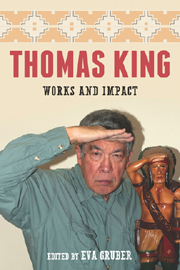Book contents
- Frontmatter
- Contents
- Preface
- Introduction
- Part 1 Works
- 1 Thomas King's Abo-Modernist Novels
- 2 “Wide-Angle Shots”: Thomas King's Short Fiction and Poetry
- 3 “Turtles All the Way Down”: Literary and Cultural Criticism, Coyote Style
- 4 Thomas King Meets Indigenous Convergent Media
- 5 Rewriting Genre Fiction: The DreadfulWater Mysteries
- 6 “All My Relations”: Thomas King's Coyote Tetralogy for Kids
- Part 2 Impact
- Part 3 Approaches
- Part 4 Encounters
- Part 5 Thomas King—A Bibliography
- Notes on the Contributors
- Index
3 - “Turtles All the Way Down”: Literary and Cultural Criticism, Coyote Style
from Part 1 - Works
Published online by Cambridge University Press: 05 February 2013
- Frontmatter
- Contents
- Preface
- Introduction
- Part 1 Works
- 1 Thomas King's Abo-Modernist Novels
- 2 “Wide-Angle Shots”: Thomas King's Short Fiction and Poetry
- 3 “Turtles All the Way Down”: Literary and Cultural Criticism, Coyote Style
- 4 Thomas King Meets Indigenous Convergent Media
- 5 Rewriting Genre Fiction: The DreadfulWater Mysteries
- 6 “All My Relations”: Thomas King's Coyote Tetralogy for Kids
- Part 2 Impact
- Part 3 Approaches
- Part 4 Encounters
- Part 5 Thomas King—A Bibliography
- Notes on the Contributors
- Index
Summary
I really am very much a North American critic and a North American writer, and I don't know that that's going to change to any great degree because, quite frankly, I have almost stopped reading critical texts and I just concentrate on the writing itself.
—Thomas King, interview with Margery Fee and Sneja GunewI first encountered Thomas King at a conference he organized at the University of Lethbridge in 1985, the year his supervisory committee judged his PhD thesis to be “satisfactory.” The conference, “The Native in Literature,” was a lively gathering of First Nations scholars, creative artists, and assorted critics. Stories emanating from the ladies' washrooms extolled the conference organizer's good looks and charisma. “This man may be a professor of Native Studies at a Canadian university,” I thought, “but he's also a wily and beguiling coyote.” Conference participants included critics Terry Goldie, Katherine Shanley (then Vangen), Jarold Ramsey, and Barbara Godard, and filmmaker Alanis Obomsawin. The conference was different from any other I had attended, and although I was not a contributor, I recorded many of the presentations on cassette tape to take back to my students in a First Nations ethnography course at UBC.
The idea of organizing a conference on the Native in literature—and the resulting volume of essays, coedited with Helen Hoy and Cheryl Calver—grew out of King's PhD thesis, “Inventing the Indian: White Images, Oral Native Literature, and Contemporary Native Writers” (1986). Indeed, much of his later work can also be traced to themes developed there.
- Type
- Chapter
- Information
- Thomas KingWorks and Impact, pp. 55 - 66Publisher: Boydell & BrewerPrint publication year: 2012

